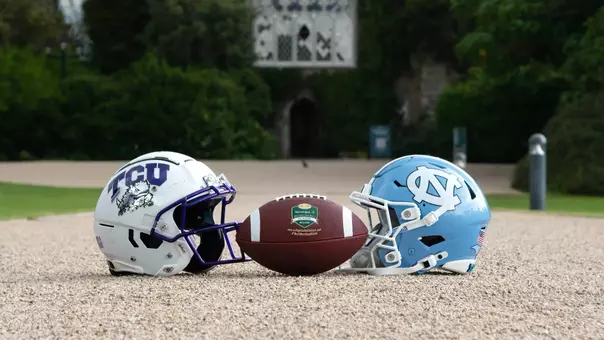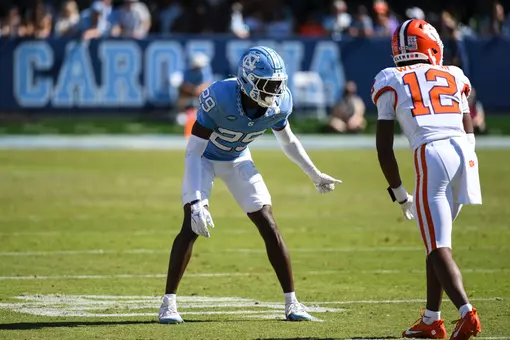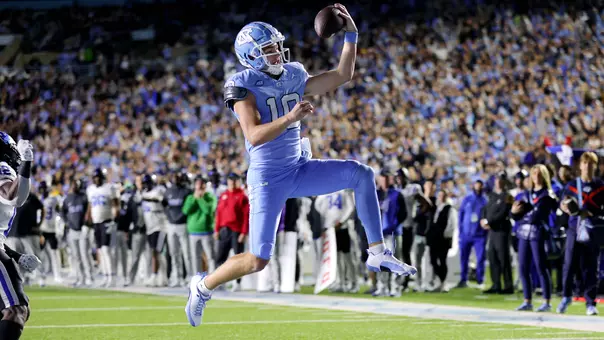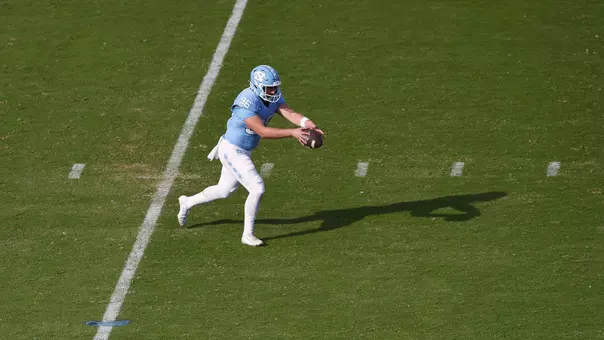University of North Carolina Athletics
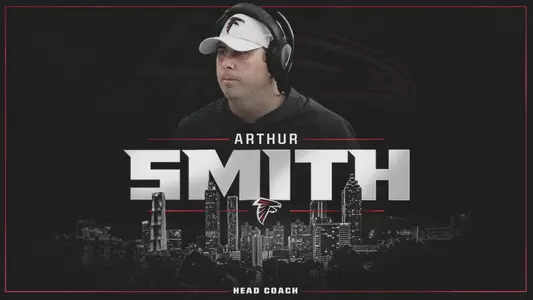
Extra Points: Arthur Smith Revisited
January 15, 2021 | Football, Featured Writers, Extra Points
The following story appeared in the September 2004 issue of "Tar Heel Monthly," a magazine published from 2002-12 before it evolved into the Rams Club's digital magazine and eventually into "Born & Bred," which is published six times a year.
By Lee Pace
At no point was quitting an option for Arthur Smith. That would have been easy—particularly when your Dad is worth $1.5 billion (according to Forbes magazine's 2003 list of the nation's richest individuals), when you've grown up in comfortable surroundings, when you went to a prestigious Washington prep school, when your horizons are such that you read the Wall Street Journal and op-ed page of The Washington Post every day.
Football? With a broken foot that won't seem to heal? With days upon weeks upon months of pain and rehab and seeing squat for results? Arthur Smith, son of FedEx founder and CEO Fred Smith, certainly had plenty of options.
But quitting? That wasn't one of them.
"It never crossed my mind," Smith says. "I was determined to do whatever it took to get back out there and help us win. I've played football since I was nine years old. It's second nature to me. I've missed not being able to compete. I want to win. I want to help this team win."
Smith enters the 2004 season listed as the second-team left guard behind Kyle Ralph. This will be his fourth season at Carolina—red-shirt as a freshman in 2001, starter at Syracuse in the second game of the 2002 season, on the sidelines ever since with a broken bone in his right foot. He has two years of eligibility remaining, perhaps three as he's applied for a medical hardship.
"When we recruited Arthur, we knew he was a tough, hard-nosed kid who loves to play football," Tar Heel head coach John Bunting says. "Some day I think he could be a great coach. He loves the intangibles about the game, loves the teamwork and has a great passion for the game. He really has a tremendous amount of pride. He has too much pride to let this injury end his career. He was going to do whatever it took to get back on the field.
"I really think Arthur will make a contribution to our program before it's all over, and I think it will be sooner rather than later."
Adds strength and conditioning coach Jeff Connors: "Nobody works harder than this kid. He did an exceptional job coming back from his injury. He's got his weight back up to 287 and his strength back and is ready to go."
Smith has not played real football since Sept. 7, 2002, when he left the Tar Heels' game at Syracuse with a painful foot. It wasn't a specific play during that game or even a snap during practice the week before that he could identify as being the actual injury. But something gave way that week, and the misery was compounded with a bout of pneumonia at the same time. The Carolina training staff at first thought Smith to be out for six to eight weeks. When Smith returned for the 2003 spring semester, his foot was still painful. Further tests, including an MRI, revealed a rare bone break on the top of his foot. He went to Charlotte to see a specialist and had more surgery. At one point, the word around the Tar Heel program was that Smith's career was over.
"It's been a long haul and it's been frustrating," Smith says. "I love the competitiveness of football, I love the team concept of it. For two years, I've felt helpless, like there was nothing I could say or do to help this team turn things around. All I could do was sit back and watch.
"I'm finally healthy again."
Asked where he sees his role on the 2004 Carolina team, Smith says directly: "I plan to compete for one of the guard spots. I'm not planning to sit back and watch."
All of the sitting and watching, he hopes, is over. Smith had a productive spring, his biggest accomplishment simply being able to last from beginning to end of 15 practice sessions.
"Arthur did a nice job getting back into the swing of things, which can sometimes be tough when you've been out for so long," offensive line coach Hal Hunter says. "He has a real hunger to get better—practicing after practice, things like that."
"The biggest thing I had to prove was that I could play every day," Smith says. "The coaches and trainers were a little unsure of whether I could get through every day. I made it—with no pain and no problems."
That in itself must have been worth celebration.
"Almost," Smith says. "But not quite, because I still have a long way to go and a lot to prove."
Smith's upbringing in Memphis within a large (nine siblings) and fabulously wealthy family and the values taught by his parents have put him in good stead as he's fought through these two difficult years.
To the table he's brought discipline, ingrained from his father and his stint as a Marine in the late 1960s.
"You have to be a disciplined person to succeed in this program," Smith says. "Coach Bunting demands discipline. As a young adult in college, there are so many distractions. Without discipline, you have no focus."
He's brought humility and the ability to assimilate into a varied group of teammates, some of whom come from Southern homes void of air conditioning.
"My Mom made sure we were all grounded," Smith says. "I grew up in a nice area and nice home, but I never felt spoiled. We got good values from our parents. We learned 'Yes sir, no sir" at an early age."
And he's brought a strong sense of individuality, of wanting to prove himself separate from family ties.
"I wanted to earn my own way to college, to get a scholarship on my own merits," Smith says. "I wanted to make a name for myself. I've used my background as motivation to be successful rather than leaning on a crutch."
Hunter says Smith blends seamlessly into the landscape with other large, athletic, fun-loving males.
"Arthur is just one of the guys," Hunter says. "You'd never know of his family's financial situation. He just wants to be accepted for who he is—not where he comes from or anything else."
The Smith family history is a fascinating story.
Fred Smith's father was an entrepreneur and started a national restaurant chain called Tottle House, which was one of the first short-order, fast-food restaurants and a precursor to the McDonald's concept.
Fred Smith attended Yale University and in 1965 wrote a term paper for an economics class that provided the genesis of an idea for what would become Federal Express. Smith observed that America was becoming more and more automated, that companies like IBM, Sperry, Univac and Burroughs were finding ways in the banking industry to replace clerks with computers. That sounded great, Smith figured, but there was a caveat:
"The minute that computer went dark, the bank couldn't function anymore," Smith said. The onus, he perceived, would be on developing a rapid and efficient logistics and delivery system to move parts from the computer manufacturing plant to the repairman in the hinterlands.
"You couldn't depend on the post office," Smith said. "You'd need a faster, more dependable, and far-reaching kind of delivery system."
That term paper is somewhat famous in FedEx lore because Smith years later jokingly said he'd made a "C" on the paper, but in truth he cannot remember what grade he received. Smith graduated from Yale in 1966 and joined the Marines, taking two tours of duty in Vietnam. When he came back from the war in 1971, he saw that computers were in fact replacing humans in a myriad of functions and that delivery systems, as he'd predicted six years earlier, were slow and inefficient.
His solution was to create a delivery system that worked like a bank clearinghouse: put all points on a network and connect them through a central hub. Smith did a little math and figured that if you wanted to connect 100 markets and did so with point-to-point deliveries, it would take 100 times 99—or 9,900—direct deliveries. But if you go through a central clearing system, it takes at most 100 deliveries.
And thus was the beginning of Federal Express.
"My Dad started the business from scratch, but he said he was never scared," Arthur says. "He says he's never been scared of anything in business because he'd flown a couple hundred missions in Vietnam. He'd been to war. It's hard to be scared after that."
Arthur's heard plenty of tales about the early days of FedEx, and one sticks out more than most.
"My Dad was looking for investors and was showing a man through one of the hangars at the airport," Smith says. "He didn't think the guy was interested. But it turned out the guy did invest in the company.
"Dad later asked him, 'What made you give me your money?' The guy told him he was impressed with how shiny the floors in the hangar were, that it showed attention to detail, that every little thing matters, that it was obviously important to the employees there to pay attention to details.'
"That's stuck with me—attention to detail."
The airline industry took note of FedEx's hub-and-spoke system—planes flying into Memphis from every dot on the map in the early evening hours, then returning to their original cities just before dawn.
"My Dad has had a profound impact on the world, on the way businesses run," Smith says. "He is my biggest role model in life. I respect him as my father and look up to him. But I also respect him as a person. He's given a lot of opportunities to a lot of people in life."
Smith went to high school at Georgetown Prep and was recruited by a number of Division I-A schools. Carolina and Georgia Tech were his favorites.
"Georgetown was in the middle of ACC territory," he says. "I'd always been an avid sports fan, and Carolina was a great attraction to me. The overall football program has great tradition, and then there's the school itself and the location. As soon as I visited Carolina, I knew this was where I wanted to go."
One sister, Rachel, is a year behind Smith at Carolina and another sister, Samantha, enters as a freshman this year. "Rachel visited because I was here and Samantha visited because the two of us were here," Smith says. "It was an easy sell. It's easy to like Carolina."
With that, Arthur Smith left for an afternoon conditioning session on the Kenan Stadium turf. Meanwhile, a white delivery truck with the familiar orange-and-purple FedEx colors drove into the parking lot outside the stadium.
EPILOGUE: It turns out Arthur Smith wasn't able to crack the starting lineup during his final two seasons at Carolina from 2004-05, but he was a dependable reserve at center and both guard spots. He thought about following his father's leads of joining the Marine Corps or corporate America but in the end decided to become a graduate assistant at Carolina for John Bunting and O-line coach Hal Hunter for the 2006 season. The coaching bug took hold and Smith set off on an odyssey that ended Friday when he was named head coach of the Atlanta Falcons. Following Carolina, he spent two years with the Washington Football Team in quality control under Hall of Fame Coach Joe Gibbs. He worked one year at Ole Miss as an intern in 2010 and joined the Tennessee Titans staff in 2011, moving steadily up the pecking order until he was elevated to offensive coordinator in 2019.
"I'm proud of Arthur and happy for him," Bunting says today. "He has a great demeanor, never panics, has a great football mind and great imagination. He's very keen on detail. He doesn't miss a trick."
"He is one of the hardest working guys I've ever known and has one of the biggest trust funds I've ever known," says Brian Chacos, his Tar Heel teammate from 2001-05. "You never would know he came from money. He was a great guy to have in the locker room as a guy to set an example. He was always helping the younger guys with technique and scheme. What a story. Imagine: He's one of 32 in the world. That's pretty special."
By Lee Pace
At no point was quitting an option for Arthur Smith. That would have been easy—particularly when your Dad is worth $1.5 billion (according to Forbes magazine's 2003 list of the nation's richest individuals), when you've grown up in comfortable surroundings, when you went to a prestigious Washington prep school, when your horizons are such that you read the Wall Street Journal and op-ed page of The Washington Post every day.
Football? With a broken foot that won't seem to heal? With days upon weeks upon months of pain and rehab and seeing squat for results? Arthur Smith, son of FedEx founder and CEO Fred Smith, certainly had plenty of options.
But quitting? That wasn't one of them.
"It never crossed my mind," Smith says. "I was determined to do whatever it took to get back out there and help us win. I've played football since I was nine years old. It's second nature to me. I've missed not being able to compete. I want to win. I want to help this team win."
Smith enters the 2004 season listed as the second-team left guard behind Kyle Ralph. This will be his fourth season at Carolina—red-shirt as a freshman in 2001, starter at Syracuse in the second game of the 2002 season, on the sidelines ever since with a broken bone in his right foot. He has two years of eligibility remaining, perhaps three as he's applied for a medical hardship.
"When we recruited Arthur, we knew he was a tough, hard-nosed kid who loves to play football," Tar Heel head coach John Bunting says. "Some day I think he could be a great coach. He loves the intangibles about the game, loves the teamwork and has a great passion for the game. He really has a tremendous amount of pride. He has too much pride to let this injury end his career. He was going to do whatever it took to get back on the field.
"I really think Arthur will make a contribution to our program before it's all over, and I think it will be sooner rather than later."
Adds strength and conditioning coach Jeff Connors: "Nobody works harder than this kid. He did an exceptional job coming back from his injury. He's got his weight back up to 287 and his strength back and is ready to go."
Smith has not played real football since Sept. 7, 2002, when he left the Tar Heels' game at Syracuse with a painful foot. It wasn't a specific play during that game or even a snap during practice the week before that he could identify as being the actual injury. But something gave way that week, and the misery was compounded with a bout of pneumonia at the same time. The Carolina training staff at first thought Smith to be out for six to eight weeks. When Smith returned for the 2003 spring semester, his foot was still painful. Further tests, including an MRI, revealed a rare bone break on the top of his foot. He went to Charlotte to see a specialist and had more surgery. At one point, the word around the Tar Heel program was that Smith's career was over.
"It's been a long haul and it's been frustrating," Smith says. "I love the competitiveness of football, I love the team concept of it. For two years, I've felt helpless, like there was nothing I could say or do to help this team turn things around. All I could do was sit back and watch.
"I'm finally healthy again."
Asked where he sees his role on the 2004 Carolina team, Smith says directly: "I plan to compete for one of the guard spots. I'm not planning to sit back and watch."
All of the sitting and watching, he hopes, is over. Smith had a productive spring, his biggest accomplishment simply being able to last from beginning to end of 15 practice sessions.
"Arthur did a nice job getting back into the swing of things, which can sometimes be tough when you've been out for so long," offensive line coach Hal Hunter says. "He has a real hunger to get better—practicing after practice, things like that."
"The biggest thing I had to prove was that I could play every day," Smith says. "The coaches and trainers were a little unsure of whether I could get through every day. I made it—with no pain and no problems."
That in itself must have been worth celebration.
"Almost," Smith says. "But not quite, because I still have a long way to go and a lot to prove."
Smith's upbringing in Memphis within a large (nine siblings) and fabulously wealthy family and the values taught by his parents have put him in good stead as he's fought through these two difficult years.
To the table he's brought discipline, ingrained from his father and his stint as a Marine in the late 1960s.
"You have to be a disciplined person to succeed in this program," Smith says. "Coach Bunting demands discipline. As a young adult in college, there are so many distractions. Without discipline, you have no focus."
He's brought humility and the ability to assimilate into a varied group of teammates, some of whom come from Southern homes void of air conditioning.
"My Mom made sure we were all grounded," Smith says. "I grew up in a nice area and nice home, but I never felt spoiled. We got good values from our parents. We learned 'Yes sir, no sir" at an early age."
And he's brought a strong sense of individuality, of wanting to prove himself separate from family ties.
"I wanted to earn my own way to college, to get a scholarship on my own merits," Smith says. "I wanted to make a name for myself. I've used my background as motivation to be successful rather than leaning on a crutch."
Hunter says Smith blends seamlessly into the landscape with other large, athletic, fun-loving males.
"Arthur is just one of the guys," Hunter says. "You'd never know of his family's financial situation. He just wants to be accepted for who he is—not where he comes from or anything else."
The Smith family history is a fascinating story.
Fred Smith's father was an entrepreneur and started a national restaurant chain called Tottle House, which was one of the first short-order, fast-food restaurants and a precursor to the McDonald's concept.
Fred Smith attended Yale University and in 1965 wrote a term paper for an economics class that provided the genesis of an idea for what would become Federal Express. Smith observed that America was becoming more and more automated, that companies like IBM, Sperry, Univac and Burroughs were finding ways in the banking industry to replace clerks with computers. That sounded great, Smith figured, but there was a caveat:
"The minute that computer went dark, the bank couldn't function anymore," Smith said. The onus, he perceived, would be on developing a rapid and efficient logistics and delivery system to move parts from the computer manufacturing plant to the repairman in the hinterlands.
"You couldn't depend on the post office," Smith said. "You'd need a faster, more dependable, and far-reaching kind of delivery system."
That term paper is somewhat famous in FedEx lore because Smith years later jokingly said he'd made a "C" on the paper, but in truth he cannot remember what grade he received. Smith graduated from Yale in 1966 and joined the Marines, taking two tours of duty in Vietnam. When he came back from the war in 1971, he saw that computers were in fact replacing humans in a myriad of functions and that delivery systems, as he'd predicted six years earlier, were slow and inefficient.
His solution was to create a delivery system that worked like a bank clearinghouse: put all points on a network and connect them through a central hub. Smith did a little math and figured that if you wanted to connect 100 markets and did so with point-to-point deliveries, it would take 100 times 99—or 9,900—direct deliveries. But if you go through a central clearing system, it takes at most 100 deliveries.
And thus was the beginning of Federal Express.
"My Dad started the business from scratch, but he said he was never scared," Arthur says. "He says he's never been scared of anything in business because he'd flown a couple hundred missions in Vietnam. He'd been to war. It's hard to be scared after that."
Arthur's heard plenty of tales about the early days of FedEx, and one sticks out more than most.
"My Dad was looking for investors and was showing a man through one of the hangars at the airport," Smith says. "He didn't think the guy was interested. But it turned out the guy did invest in the company.
"Dad later asked him, 'What made you give me your money?' The guy told him he was impressed with how shiny the floors in the hangar were, that it showed attention to detail, that every little thing matters, that it was obviously important to the employees there to pay attention to details.'
"That's stuck with me—attention to detail."
The airline industry took note of FedEx's hub-and-spoke system—planes flying into Memphis from every dot on the map in the early evening hours, then returning to their original cities just before dawn.
"My Dad has had a profound impact on the world, on the way businesses run," Smith says. "He is my biggest role model in life. I respect him as my father and look up to him. But I also respect him as a person. He's given a lot of opportunities to a lot of people in life."
Smith went to high school at Georgetown Prep and was recruited by a number of Division I-A schools. Carolina and Georgia Tech were his favorites.
"Georgetown was in the middle of ACC territory," he says. "I'd always been an avid sports fan, and Carolina was a great attraction to me. The overall football program has great tradition, and then there's the school itself and the location. As soon as I visited Carolina, I knew this was where I wanted to go."
One sister, Rachel, is a year behind Smith at Carolina and another sister, Samantha, enters as a freshman this year. "Rachel visited because I was here and Samantha visited because the two of us were here," Smith says. "It was an easy sell. It's easy to like Carolina."
With that, Arthur Smith left for an afternoon conditioning session on the Kenan Stadium turf. Meanwhile, a white delivery truck with the familiar orange-and-purple FedEx colors drove into the parking lot outside the stadium.
EPILOGUE: It turns out Arthur Smith wasn't able to crack the starting lineup during his final two seasons at Carolina from 2004-05, but he was a dependable reserve at center and both guard spots. He thought about following his father's leads of joining the Marine Corps or corporate America but in the end decided to become a graduate assistant at Carolina for John Bunting and O-line coach Hal Hunter for the 2006 season. The coaching bug took hold and Smith set off on an odyssey that ended Friday when he was named head coach of the Atlanta Falcons. Following Carolina, he spent two years with the Washington Football Team in quality control under Hall of Fame Coach Joe Gibbs. He worked one year at Ole Miss as an intern in 2010 and joined the Tennessee Titans staff in 2011, moving steadily up the pecking order until he was elevated to offensive coordinator in 2019.
"I'm proud of Arthur and happy for him," Bunting says today. "He has a great demeanor, never panics, has a great football mind and great imagination. He's very keen on detail. He doesn't miss a trick."
"He is one of the hardest working guys I've ever known and has one of the biggest trust funds I've ever known," says Brian Chacos, his Tar Heel teammate from 2001-05. "You never would know he came from money. He was a great guy to have in the locker room as a guy to set an example. He was always helping the younger guys with technique and scheme. What a story. Imagine: He's one of 32 in the world. That's pretty special."
UNC Baseball: Diamond Heels Hold Off Longwood, 5-3
Thursday, February 19
UNC Softball: Barbee, Thompson Lead Heels Past Radford, 6-0
Thursday, February 19
Hubert West: 2026 Tar Heel Trailblazer
Wednesday, February 18
UNC Baseball: Tar Heels Shut Down Richmond, 10-0
Wednesday, February 18











